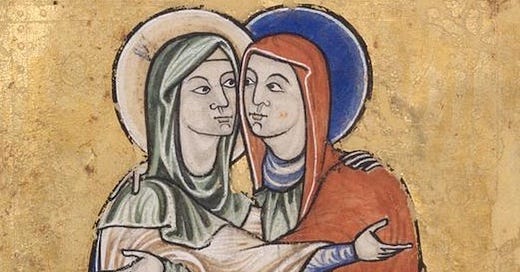Just keep doing what you’re doing.
That seems to be the advice I’m constantly giving and receiving this week in response to the electoral disaster. I’m reflecting on why, since it might seem out of character for me as a person who makes his living advising people how to pivot and evolve and reinvent.
I’m sure all that is coming, but emotionally none of us are there yet. We are rediscovering who we are and what matters to us in response to a great shock. So maybe I shouldn’t be surprised that I and everyone I talk to are returning to their identities as people who care for other people: in profession, in vocation, in character.
I am learning from so many of you how much stability being a helper provides. It gives us purpose. It gives us community. It gives us connection, not just through crass mutual interest or shared enthusiasms but though profound bodily solidarity with others. It makes me wonder if monastic orders were built around care for these reasons just as much as the religious ones. I am able to sit at my computer and do work today because I know so many of you are doing yours as nurses, social workers, and teachers. You sustain me.
But I am also noticing that care provides a kind of sociopolitical stability, one those medieval brothers and sisters also surely understood. No matter what kind of country we become, people will get sick, people will burn out, people will have babies. And their ideas about what to do in those situations are much more persistent than their political preferences. Their needs keep them connected to us, no matter if some of them treat us with contempt, a situation any nurse knows well.
To be clear, our institutions of care will be deeply challenged by what’s coming. (I wrote earlier in the week about the problems our organizations must face no matter the electoral outcome.) Many of them are already on the brink from underfunding, poor leadership, private equity rapacity — you know the score. But if I had to place a bet on whether the Mayo Clinic or NATO is more likely to be around ten years from now, I have no doubt which one I’d choose.
And unlike much of the rest of society, our institutions and our workforces have well-developed muscle memory on how to cope with crisis. In fact, we have an immediately useful precedent for how to deal with social calamity in the COVID-19 pandemic. Not the fragmented toilet paper pandemic of public memory, mind you, but the PPE and respirators pandemic we couldn’t forget if we wanted to.
I don’t mean my advice to be so simple as “get ready for another pandemic” (despite the RFK of it all). Anybody who says they know what’s coming is full of it. All I am saying is that our identity as helping professionals gives us a kind of organizational resilience that regenerates as reliably as Doctor Who. It doesn’t always turn out exactly how we expect, but it always happens.
Another feature of care that will make it resilient in these times is its inclusivity. If I’m realistic, most of the people reading this probably voted against Trump, but there is no reason helpers who supported him need to be excluded from this message. I may not understand your political choices, but I can understand you as a doctor or a nurse. We are in this work together.
That’s all I’ve got for today. In my political brain I’m taking solace from Jon Stewart, but in the rest of my self I am taking solace from you. My job is to help you adapt to this crazy world through strategy and creativity when the time is right. For some of you it will be soon, but for others you may need to lay low for a few years. No matter the situation, my line is open for anyone who cares.
Keep doing what you’re doing. I will too.




One extra thought: I was considering this morning that our caring professions have pretty well-developed ideas about self-care, even though many people still find it difficult. I know I would not take self-care seriously if I didn't spend so much time around nurses and social workers, and I'm still amazed at how often I forget that it is necessary if I'm going to have any chance of doing good for others.
Let's hold on to these traditions even more tightly and think about how to share them with others who need them -- there are going to be folks who have white-knuckled for years who will break down as a result of these events, and we need to be ready to embrace them.
Thanks, Andy. We are in a time when it's important to support those who support us. We need to show up for one another. I've recently renewed my work with cross-border youth (binationals). Needless to say, these young people are experiencing a lot of apprehension. I am more determined than ever to be there for them as I watched over the years the ways in which they are there for one another (including me). Here in Arizona, we are exchanging the words "Bear down" and not referring to UA football. I'm spending Thanksgiving in Agua Prieta and looking forward to giving thanks for one another with my adopted Mexican family. Hug Rad and Lindsay for me, and hugs to yourself.